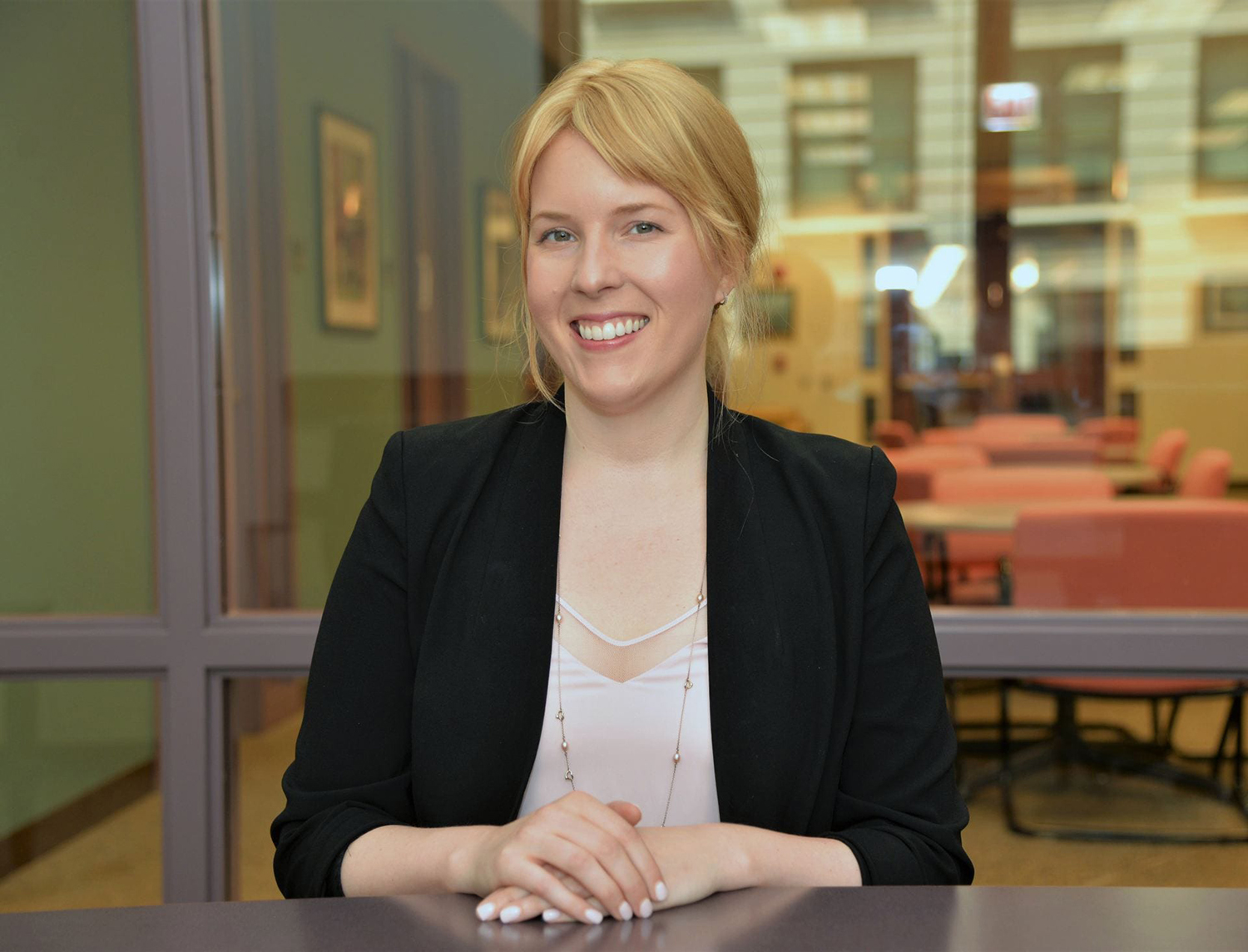 Associate Professor of Management and Entrepreneurship Grace Lemmon was named director of the DBA program, succeeding Associate Dean and Professor Robert Rubin.
Associate Professor of Management and Entrepreneurship Grace Lemmon was named director of the DBA program, succeeding Associate Dean and Professor Robert Rubin. Grace Lemmon, associate professor of management & entrepreneurship, has been named director of the Doctorate in Business Administration (DBA) Program at the Kellstadt Graduate School of Business.
Lemmon previously served as associate director of the program and succeeds Associate Dean and Professor Robert Rubin, who helped launch the program in 2016.
The part-time, three-year program teaches experienced business professionals to master research methodology, preparing them to become agents of change in the C-suite or to
transition to full-time academic roles. DBA candidates study as a small cohort in weekend classes taught by Kellstadt faculty approximately once a month during the school year, allowing busy professionals to continue working during the week.
A DePaul alumna, Lemmon researches weight-based mistreatment at work, as well as workplace stress management. She is the recipient of several research awards and grants and is currently a 2019-2020 Wicklander Fellow at DePaul’s Institute for Business & Professional Ethics. She also received the 2020-2021 Spirit of DePaul Award for her contribution and commitment to DePaul University.
Below, we spoke with Lemmon about her future plans for the DBA program.
What’s in store for the DBA program and what are you hoping to accomplish in your new role?
I like to tell students that the skills they learn in a master’s program are how to effectively carry out the facts they read about in textbooks and cases. By comparison, the skills you learn in a doctoral program are how to generate those facts. To me, the DBA is such an empowering degree – it’s a degree that teaches you how to discover. Of course, discovery is of no use if it stays locked in your hard drive. We want to teach students how to push their research into the hands of others. Right now we have a course on research dissemination in the student’s third year, but we plan to add additional co-curricular events that address crafting a personal brand around your research ideas, representing your research in a corporate setting and more.
Our program is interesting because we don’t focus on growth in numbers, necessarily. We keep cohorts small to best manage our learning community. Our students are best at finding their voices in more intimate learning environments, where faculty have time for all, and conversations include everyone’s thoughts. But we are, with each graduating class, growing our alumni base. I’m hoping that once we resolve the COVID-19 crisis, we can host a reunion for our graduated classes, and provide an opportunity for our current students to network with those graduates as well.
As a next concrete step, now that we have graduated three cohorts, I will be putting together an alumni advisory board. That board will provide information on how they are leveraging their degrees post-graduation, and provide advice on any curricular or marketing efforts that reflect the utility of the degree that they perceive, now that it’s in hand.
What do career outcomes look like for graduates of the program?
Because the program appeals to both students who seek academic jobs and new corporate roles, statistics about placement are slightly misleading. However, I can share that our program is diverse: 46% are female, 39% are students of color, and 35% of students travel in from outside of Illinois. In our recently graduated class, students who were interested in a full-time academic role were able to find one. Several students were recruited for tenure-track academic roles and one student landed a very prestigious job leading the Polsky Center for Entrepreneurship and Innovation at the University of Chicago. In previous cohorts, students leveraged the degree to take on executive-facing corporate projects, created a startup, and were otherwise corporately mobile.
How will your experience in academia influence your new role?
Lucky for me, my field of expertise is organizational behavior. This means that understanding and working with the dynamics of a high-touch, cohort-based program, which includes managing group interactions, supporting quality professor-student relations, and creating a culture of inclusivity and learning, are not foreign concepts to me. I know exactly what the textbooks and research say on the topics, but also know from my experience as associate director of the program what the unique needs of our students and faculty are.
I’m also very fortunate to have had the opportunity to participate in the program’s administration in a meaningful way prior to this new position, and to have been coached and mentored very effectively by the DBA program’s creator and first director, Bob Rubin.
I will also say that my academic interest in stress also will influence my new role – specifically, the design and rhythm of the program are meant to continually push students just a little past their limits of intellectual comfort. Being a bit of a research nerd for a moment, this means that we carefully introduce “challenge stressors,” or stressors that, when appropriately addressed,
move someone closer to a valued goal, which, in this case, is attaining doctoral-level research skills. My role is to constantly monitor that roll-out of challenge stressors so that students can benefit from incremental improvement after incremental improvement without burning themselves out.
Learn more about the DePaul DBA